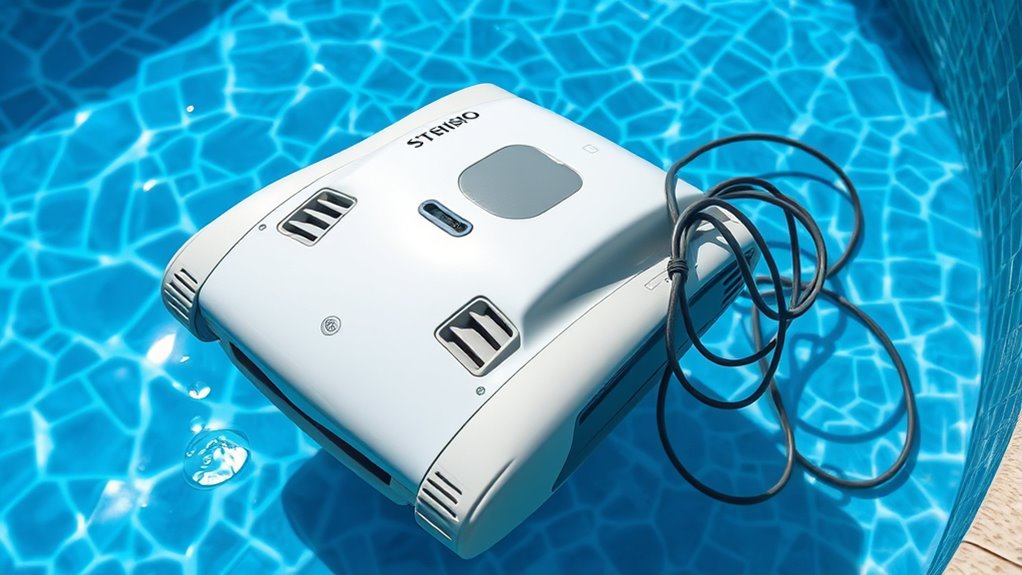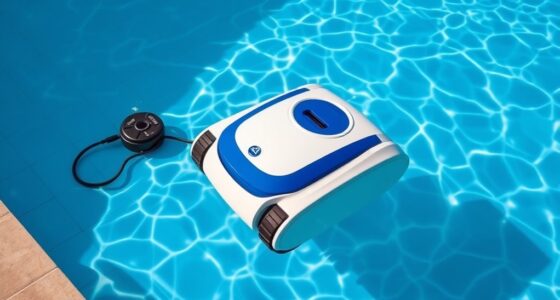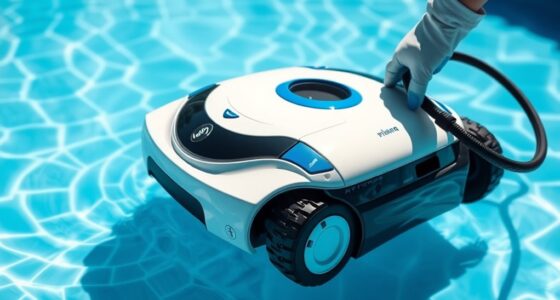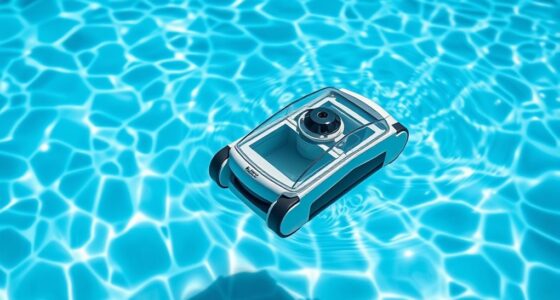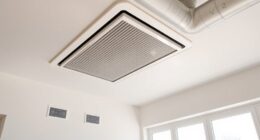Automatic pool cleaners usually last between three and eight years, depending on their quality, how well you maintain them, and how often you use them. Higher-end models with durable components tend to last longer, while cheaper options may need replacement sooner if not properly cared for. Regular cleaning, inspections, and following the manufacturer’s maintenance schedule can help extend their lifespan. Keep exploring to discover tips for getting the most out of your cleaner.
Key Takeaways
- Higher-end models typically last between 5 to 8 years with proper maintenance.
- Cheaper or poorly maintained cleaners may need replacement after 3 to 4 years.
- Regular cleaning, filter checks, and following manufacturer schedules extend lifespan.
- Robotic cleaners, despite complex parts, are designed for longer durability when maintained.
- Proper usage and timely repairs can significantly prolong the operational life of automatic pool cleaners.
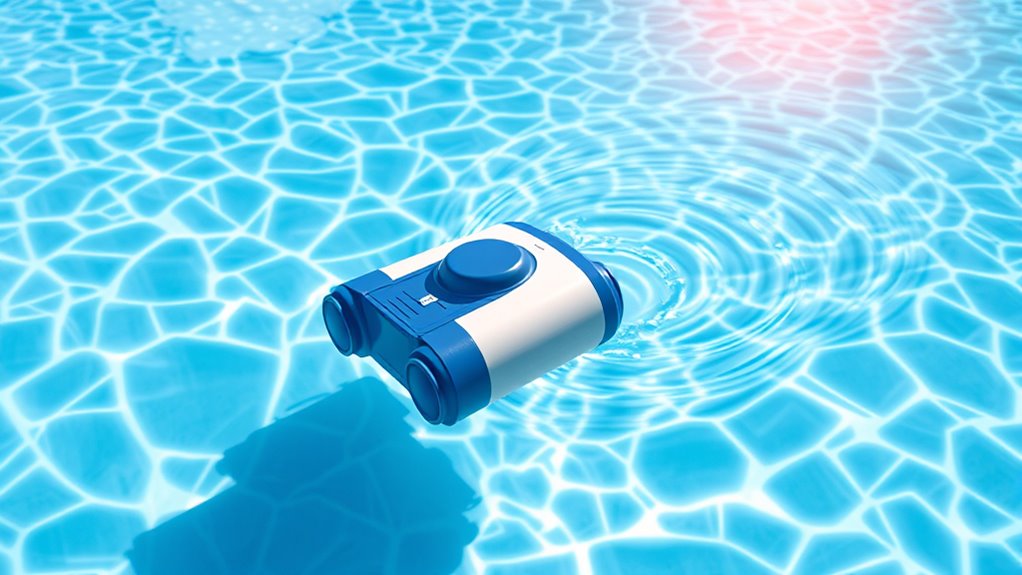
Wondering how long your automatic pool cleaner will last? The lifespan of your device depends on several factors, but with proper care, you can maximize its durability. When it comes to pool maintenance, taking good care of your cleaner not only extends its life but also ensures it operates at peak energy efficiency. Regularly inspecting and cleaning the brushes, filters, and wheels helps prevent buildup that can cause unnecessary wear. Keeping the debris basket emptied and filters clean minimizes strain on the motor, reducing the risk of overheating and motor failure. It’s also important to follow the manufacturer’s recommended maintenance schedule to catch potential issues early. Additionally, understanding the impact of maintenance practices can help you better care for your cleaner and prolong its useful life. The quality of your automatic pool cleaner plays a significant role in how long it lasts. Higher-end models built with durable materials tend to have longer lifespans, often lasting five to eight years with proper care. Cheaper models, on the other hand, may need replacement sooner—sometimes within three to four years—especially if they’re used frequently or not maintained properly. The type of cleaner you choose can influence its durability as well. Robotic cleaners, for instance, generally have more complex components but are often designed for longer use if maintained correctly. Suction-side or pressure-side cleaners are usually simpler and may wear out quicker if not maintained. Proper maintenance routines can extend the life of these units, even those with more basic designs. A well-maintained cleaner not only lasts longer but also operates more effectively, reducing the need for costly repairs. Regular maintenance also helps prevent clogging and blockages, which can strain the motor and reduce cleaning efficiency. Energy efficiency is another essential aspect that impacts your automatic pool cleaner’s longevity. A well-maintained cleaner runs more efficiently, consuming less power and reducing strain on its motor. This efficiency not only saves you money on energy bills but also minimizes wear and tear on the device. If your cleaner struggles to pick up debris or moves sluggishly, it’s a sign that it needs cleaning or part replacement. Investing in models with energy-efficient motors can also help extend its lifespan, as these units are designed for longer and more reliable operation. Properly running cleaners don’t overheat or work harder than necessary, which means fewer breakdowns and repairs. Additionally, selecting a model with high-quality construction and durable components can significantly influence its lifespan, making maintenance and replacement less frequent. Ultimately, your automatic pool cleaner’s lifespan hinges on consistent maintenance, choosing quality models, and ensuring it operates efficiently. When you stay on top of regular cleaning routines and heed manufacturer advice, you’re not just prolonging its life—you’re also maintaining an effective and energy-efficient pool cleaning process. Remember, a cleaner that runs smoothly consumes less power, lasts longer, and keeps your pool sparkling clean with less effort. So, treat your device well, and it will serve you reliably for years to come.
Frequently Asked Questions
Can I Repair My Automatic Pool Cleaner Myself?
You can try DIY repairs on your automatic pool cleaner, but it depends on the issue. For simple problems like clogged filters or loose parts, you might fix it yourself. However, for more complex issues, it’s better to consult your warranty coverage first, as attempting repairs could void it. Always weigh the risk of DIY repairs against professional service to keep your cleaner running smoothly.
What Factors Influence the Lifespan of a Pool Cleaner?
Your pool cleaner’s lifespan depends on several factors, including maintenance tips and technological advancements. Regularly cleaning filters, checking for clogs, and replacing worn parts can extend its life. Staying updated with technological improvements guarantees you’re using efficient models, which tend to last longer. Proper care and embracing new innovations help maximize your pool cleaner’s durability, so you get the most value and performance over time.
How Often Should I Replace the Brushes or Filters?
You should replace your pool cleaner’s brushes and filters regularly, just like you’d refresh your pool’s water, to maintain ideal pool maintenance and extend your robot’s lifespan. Usually, inspect brushes every 4-6 weeks and replace them if they’re worn or cracked. Filters also need changing every few months, depending on usage. Staying attentive to these parts keeps your cleaner effective, prolongs its life, and keeps your pool sparkling clean.
Are There Signs Indicating My Cleaner Needs Replacing?
You should watch for signs like reduced cleaning performance, strange noises, or frequent malfunctions, which indicate your automatic pool cleaner may need replacing. Regular maintenance tips, like cleaning filters and brushes, help keep it efficient. If these issues persist despite maintenance, it’s a sign to contemplate a new cleaner to maintain energy efficiency and guarantee your pool stays clean. Staying attentive ensures ideal performance and extends its lifespan.
Does Usage Frequency Affect the Cleaner’S Longevity?
Your usage frequency does impact your automatic pool cleaner’s longevity. The more often you use it, the faster the battery life may decline, especially if you don’t follow proper maintenance tips. To extend its lifespan, make certain regular cleaning of filters, avoid overworking it, and recharge the battery fully after each use. Proper care helps maximize your cleaner’s durability, keeping it running smoothly for years to come.
Conclusion
Ultimately, how long your automatic pool cleaner lasts depends on how well you maintain it, how often you use it, and the quality you choose. Regular cleaning, prompt repairs, and proper storage extend its lifespan. Invest in a reliable model, follow the manufacturer’s instructions, and stay attentive to signs of wear. By caring for your cleaner, you ensure it works efficiently, lasts longer, and keeps your pool pristine, giving you more time to enjoy your sparkling oasis.
